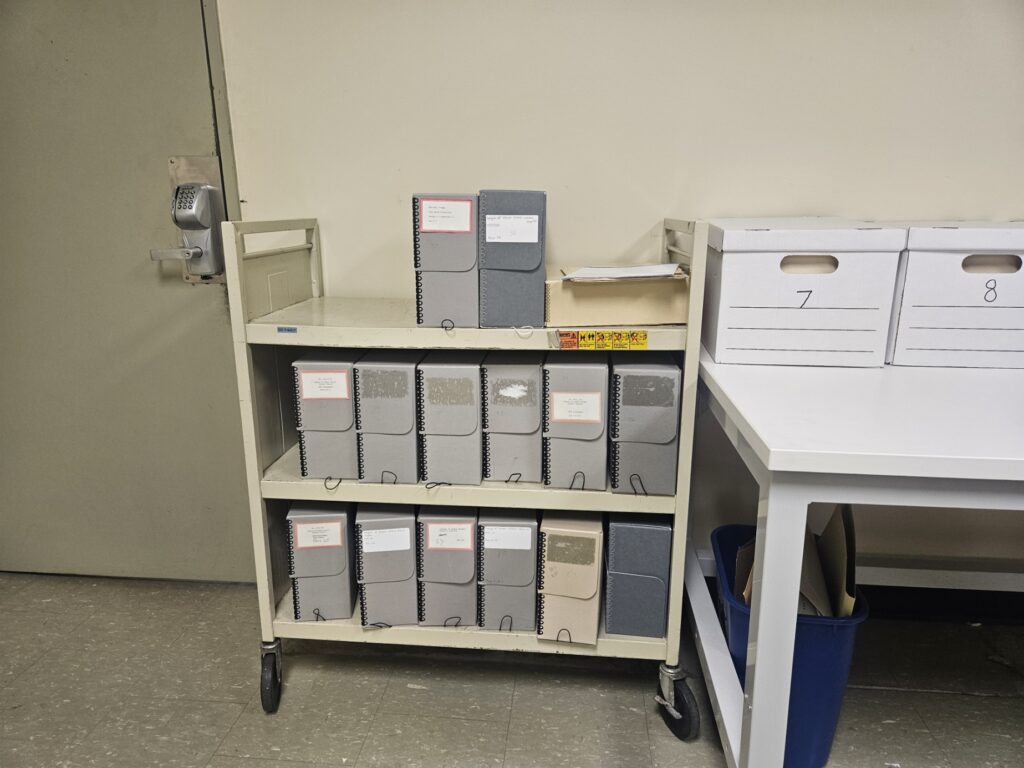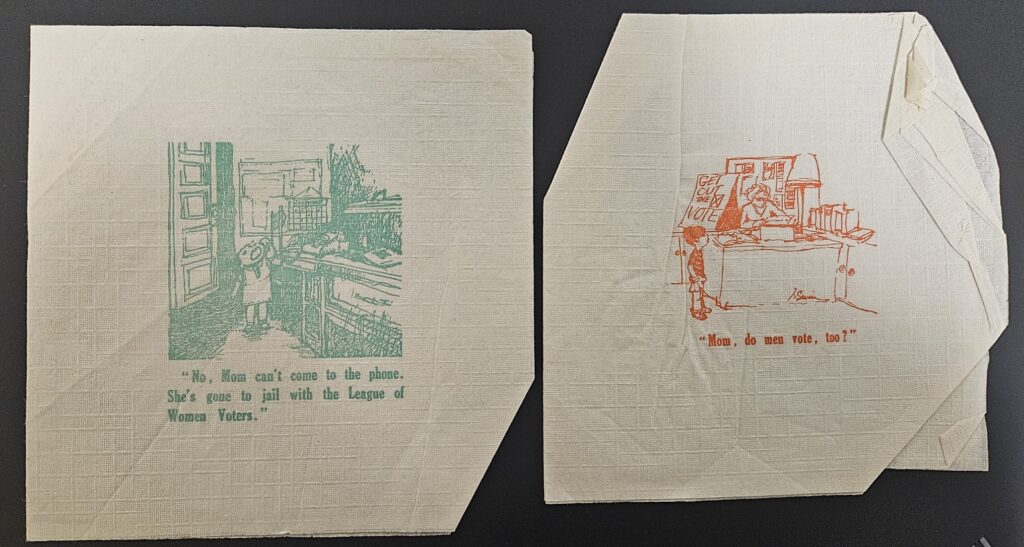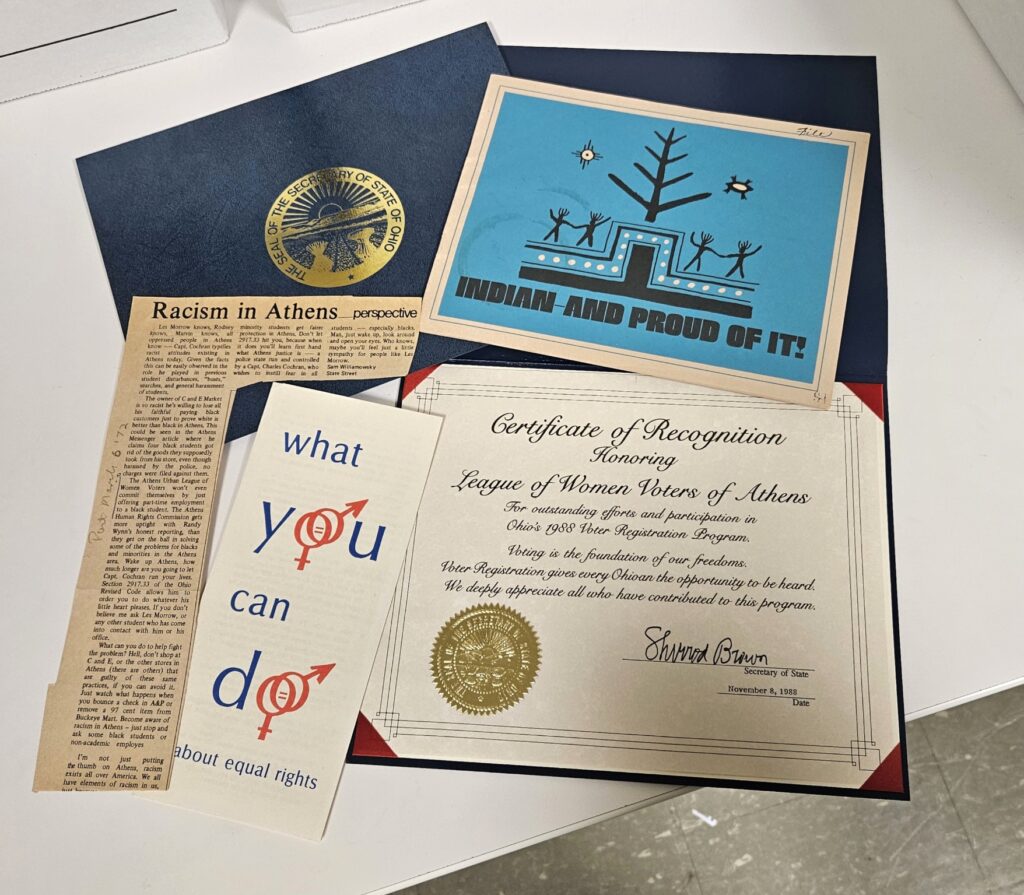By Alexis Reynolds, English and World Religions ’26, Spring 2025 Manuscript Archives Intern
“Saw the wood in front of you” is what OU alumnus, David Crane*, said at a talk that I attended last semester. That phrase has never been more relevant to me than right now as I make my way through the Mahn Center Archives as a student intern preparing for law school. When I applied for this internship, I had no idea what I was doing. The job seemed fun, beneficial, and informative, but in the coming days before I was supposed to start, I caught myself wondering if this was the right path to go down for what I wanted to accomplish career-wise. It was then that Mr. Crane’s saying popped into my head. Crane, who is a lawyer himself, mentioned this metaphor during the talk to explain that some experiences, even if we never plan for them, or think they are irrelevant to our goals, are important to have because you never know where they could lead you. So, on January 13th of 2025 I decided to “saw the wood in front of me” and view the Mahn Center internship as a new experience that could lead me down the path of a lifetime. And, in a way, it kind of did, because it introduced me to the League of Women Voters.

Now, to be honest with you, I had never even heard of the League of Women Voters until I started this project. I could only guess that the organization dealt with, you guessed it, voting. But that was about it. So, on my first official day at the Archives, I took one look at the cart/collection I was going to be working on and about ran out the door. It was filled to the brim with different documents and folders. I felt out of my depth, and let me tell you, I was really sinking.
Add on the fact that (and I’ve never told anyone this before) I found the collection to be a bit boring at first…okay maybe a lot boring. So, let’s keep this between you and me…and my supervisor who’s proofreading this draft…and anyone else who reads this blog post—oh! forget it! I thought it was boring alright, I confess! But there is this little trick I picked up a couple years back. It’s called radical acceptance. Basically, if I’m in a discomforting situation, I take a deep breath, acknowledge that the situation sucks, accept that fact and continue throughout my day. So, I decided to radically accept the situation I was in with the collection, and it actually got me somewhere.
I could have quit when I saw the stacks of boxes on that cart, or when I realized organizing the League of Women Voters collection wasn’t as exciting as handling rare materials from ancient Greece (no, I didn’t actually expect to be doing that). I could have quit countless times, but I decided to radically accept my circumstances, and I ended up learning a lot about an amazing organization that has done so much for the community. I even met new friends in the organization and gained some valuable work experience. What I’m trying to say is that working on this collection is actually kind of neat. These materials may be from the past, but they could never be more relevant.
Processing Materials
Now, when I say the collection seemed boring at first, I don’t mean the material itself. I’m talking about the actual processing part. Considering that somedays this process made me want to tear my hair out, I won’t recount too much of the process and inflict that on you…well maybe a little.
My job was to go through all those files that I mentioned, and make sure each file contained the information that it said it did. If not, then I needed to make a new folder or add to another existing folder. After about 8 weeks (yeah, you heard me, 8 weeks) I finished processing all the materials that I was given. So, let’s just say that my spring break was very much needed.
But during those days that I wanted to rip my hair out, there would be little things that kept me going. A funny joke from one of the other interns, the idea of writing this blog post, and most effectively, a really cool piece of material. One of my all-time favorite parts of this collection, are two napkins that I found with cartoons drawn on them and tiny jokes beneath. It’s material like that, or at least the thought that I’d find more cool material like the napkins, that gave me motivation to keep working.

This internship has also gotten me to think a lot more about history in general. As I became more and more grateful for the history that I was holding in my hands, I began to wonder about what was missing. How many other napkins were there that went into the garbage chute? Were there other letters from members that were forgotten? There are gaps in history. That’s a fact. But what do we do with those gaps? Fill them in the best we can? Forget them?
In a reflection of this internship for an assignment, I decided to write a poem surrounding this question of gaps in history. I’ve included the poem below to help better express my feelings regarding this subject. (Don’t be mean either, I’m not the best poet).
To the Lost Things
Oh! to be in that room!
To hold the quill to paper
Press my fingers on the keys
Of a typewriter
But the pieces of paper tell a story, don’t they?
A story that has played out
In the lives of those who came before
Is it wrong to ponder
the gaps in these stories?
To search for answers
and create my own?
But I wonder about those in the gaps
How are they remembered?
The ordinary. The followers.
Those with their heads down, pushing history
who support the Great Men in our textbooks
What of the ordinary poor people in Athens
Who fought and created and protected their city—
the greatest city in all of Greece?
What of the ordinary men and women of Athens, Ohio
Who fought and created and lobbied
For their fellow citizens’ rights to vote
Sometimes there are no letters or documents
To fill in the gaps
So, it is to those within the gaps—
the people, the items, and the stories
The lost things and the forgotten things
That I write to now
You are not forgotten
You are not lost
Someone out there is remembering your contributions
Your experiences and your sacrifices
Oh! to be in that room that you were in
So that I can see your stories and lives unfold
But all I have are these pieces of paper, the gaps
they leave open (with you inside), and the task you have given me
I will tell your story; one piece, one word, one life at a time
The Past and Present

However, while I’ve been interested in the past I’ve also been interested in the present as well. I learned that the League of Women Voters is still active right here in Athens, and thanks to my former professor Dr. Sullivan, I was able to meet some of the members. These people are smart, kind, and caring. Upon meeting them, I saw the same tenacity and passion for the League that I saw reflected in the content of the collection. It was amazing to see that some of the issues being addressed in the 50s are still being fought for today and with the same vigor and creativeness that was conveyed through the manuscripts.
All in all, working on this collection has been a blast. The updated finding aid for The Ohio League of Women Voters, Athens Chapter records is now available online. For the remainder of my internship I will be working on an exhibit that will showcase this amazing organization and all the work they have done and continue to do. Be sure to check it out on the 4th floor of Alden during the fall 2025 semester. Anyways, I would like to wish a happy 75th Anniversary to the League of Women Voters! Thank you for all that you have done for this community, and we can’t wait to see what you do next.
*The Mahn Center includes a collection of David Crane diaries from when he was Chief Prosecutor of the U.N. Special Court for Sierra Leone.